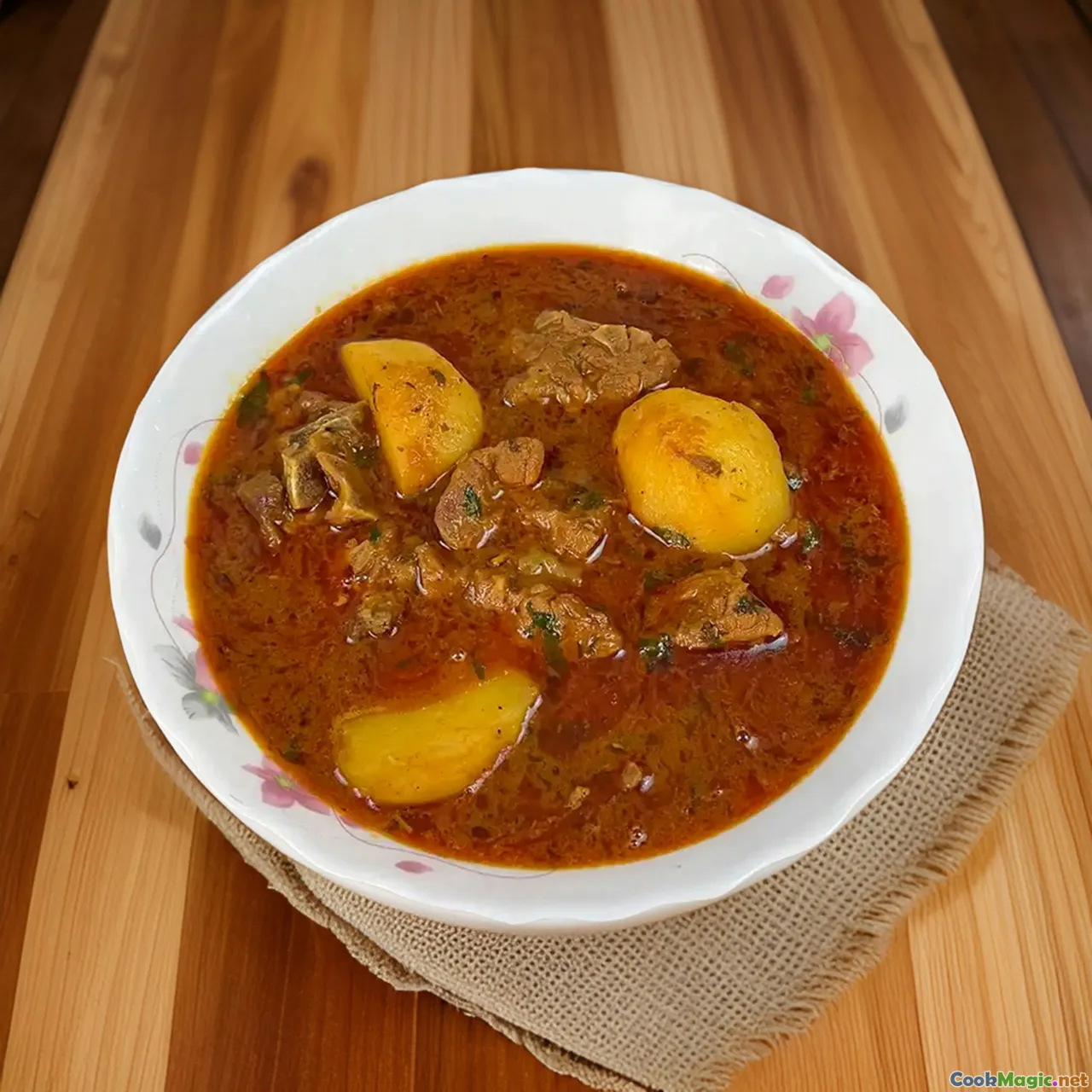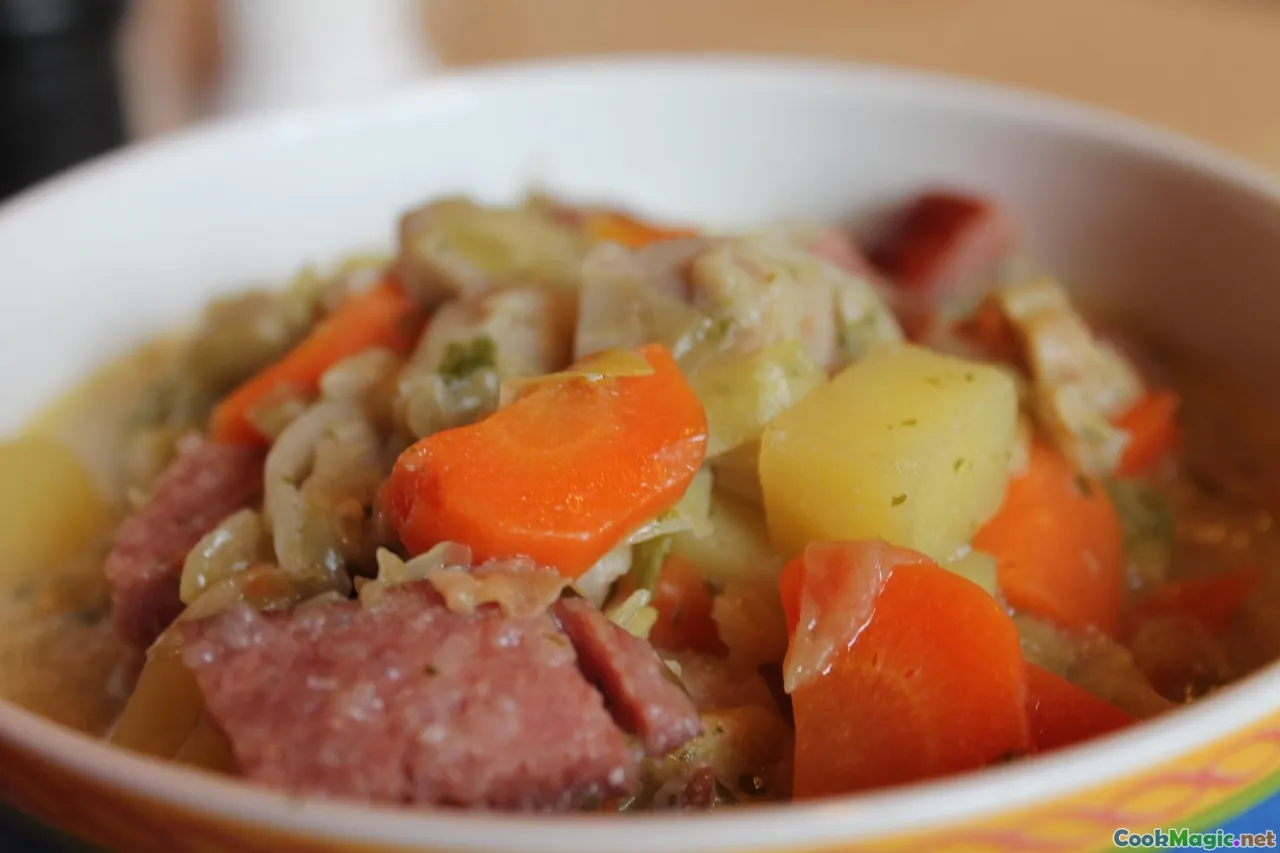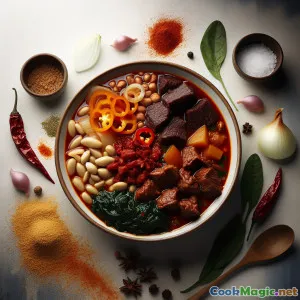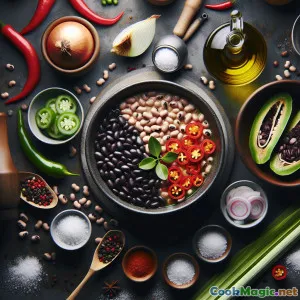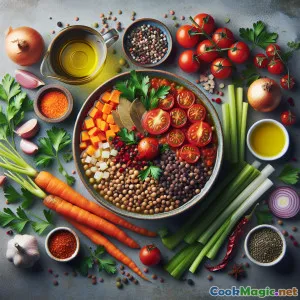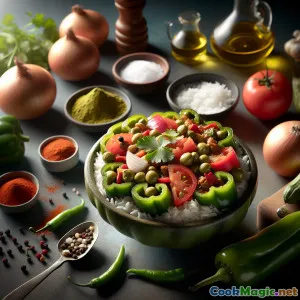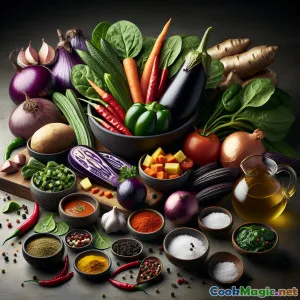
Ragoût de Légumes du Jardin Batibo Mbongo : Ragoût de Légumes du Nord-Ouest du Cameroun
(Batibo Garden Mbongo: West Cameroonian Vegetable Stew)
(0 Avis)0
47
juillet 24, 2025
Signaler un problème
Ingrédients
-
300 grams Aubergine du jardin (aubergine africaine)
(Wash and cut into chunks)
-
2 tablespoons Épice Mbongo (également appelée mélange Mbongo Tchobi)
(Available in African markets)
-
150 grams Gombo
(Haché)
-
150 grams Feuilles d'épinard fraîches
(Lavage et haché)
-
2 medium Carottes
(Peeled and cut into cubes)
-
1 large Patates douces
(Épluché et coupé en dés)
-
3 large Tomates
(Haché)
-
1 large Oignon rouge
(Tranché)
-
4 cloves Ail
(Haché)
-
1 tablespoon Gingembre
(Râpé fraîchement)
-
1 liter Bouillon de Légumes
(Low-sodium)
-
3 tablespoons Huile de palme
(Traditional choice, but can use vegetable oil)
-
1 whole Piment Habanero
(Optional for spice. Remove seeds if desired)
-
2 tablespoons Persil ou feuilles aromatiques
(Haché finement)
-
1 teaspoon Sel
(À votre goût)
-
0.5 teaspoon Poivre noir
(Wash and cut into chunks)
(Available in African markets)
(Haché)
(Lavage et haché)
(Peeled and cut into cubes)
(Épluché et coupé en dés)
(Haché)
(Tranché)
(Haché)
(Râpé fraîchement)
(Low-sodium)
(Traditional choice, but can use vegetable oil)
(Optional for spice. Remove seeds if desired)
(Haché finement)
(À votre goût)
Nutrition
- Portions: 4
- Taille de portion: 1 bol (350g)
- Calories: 260 kcal
- Carbohydrates: 47 g
- Protein: 7 g
- Fat: 7 g
- Fiber: 9 g
- Sugar: 10 g
- Sodium: 540 mg
- Cholesterol: 0 mg
- Calcium: 110 mg
- Iron: 3.2 mg
Instructions
-
1 - Prepare Vegetables:
Wash and chop all vegetables as described in the ingredients. Reserve each in separate bowls.
-
2 - Create Flavor Base:
In a large saucepan, heat the palm oil over medium flame. Add onion, garlic, and ginger. Saute until soft and fragrant, about 5 minutes.
-
3 - Build the Stew:
Add tomatoes, garden egg, carrots, sweet potatoes, and stir. Cook for 5 minutes to start releasing juices.
-
4 - Add Broth and Spices:
Pour in the vegetable broth. Sprinkle Mbongo spice, add salt, black pepper, and habanero pepper. Stir well to dissolve spices into the broth.
-
5 - Simmer to Perfection:
Simmer on medium-low, covered, for 25-30 minutes. Add okra and spinach with 10 minutes left of cooking, so they remain vibrant but softened.
-
6 - Taste and Finish:
Check tenderness of veggies. Adjust salt or spice if needed. Toss in chopped parsley or scent leaves before serving.
Wash and chop all vegetables as described in the ingredients. Reserve each in separate bowls.
In a large saucepan, heat the palm oil over medium flame. Add onion, garlic, and ginger. Saute until soft and fragrant, about 5 minutes.
Add tomatoes, garden egg, carrots, sweet potatoes, and stir. Cook for 5 minutes to start releasing juices.
Pour in the vegetable broth. Sprinkle Mbongo spice, add salt, black pepper, and habanero pepper. Stir well to dissolve spices into the broth.
Simmer on medium-low, covered, for 25-30 minutes. Add okra and spinach with 10 minutes left of cooking, so they remain vibrant but softened.
Check tenderness of veggies. Adjust salt or spice if needed. Toss in chopped parsley or scent leaves before serving.
En savoir plus sur: Ragoût de Légumes du Jardin Batibo Mbongo : Ragoût de Légumes du Nord-Ouest du Cameroun
Batibo Garden Vegetable Mbongo: Summary, Tips, History, and Cultural Insights
Batibo Garden Vegetable Mbongo is not only a feast of flavors and colors but also a vibrant tribute to Batibo—a verdant township in Cameroon’s Northwest Region, famed for its lush home gardens and the distinctive Mbongo (Mboyo) spice blend. Traditionally, Mbongo Tchobi refers to a spicy, aromatic Cameroon black stew—often made with bushmeat or fish and deeply flavored with charred, smoky spices such as njansa, round African nutmeg, and alligator pepper. This recipe offers a creative vegetarian/vegan take leveraging the vast bounty of Batibo-style home gardens, brimming with garden eggs (African eggplants), sweet potatoes, okra, spinach, and carrots.
The beauty of this dish lies in its captivating flavor complexity. The Mbongo spice—a smoky medley that defines the stew—lends the dish sumptuous depth and a distinctive bittersweet aroma, while palm oil imparts its telltale ruby hue. The blend with hand-selected vegetables draws on local West Cameroonian traditions where stews are communal, shareable, and hearty, often served at family feasts or to honor special guests.
Culinary History & Cultural Importance
The "Mbongo Tchobi" stew hails from the Bamileke and Basaa ethnic groups, but its popularity stretches across Anglophone Cameroon, including Batibo, where blending this iconic spice with freshly harvested veggies is an innovation reflecting Cameroon’s dynamic, multicultural foodways. Garden eggs are foundational in coastal and grassfield cuisines alike, cherished for their bittersweet edge and smoothing mouthfeel. Sweet potatoes offer comforting starch and color, while okra provides the craveable, silky viscosity true fans love.
Stews like this are a staple—designed for flexible, nourishing eating and slow, smoky cooking methods that suit firewood kitchens and Sunday family cooking. This vegetable-forward option also embraces Batibo’s progressive move towards healthier, plant-based eating while holding close to cherished culinary roots.
Tips & Notes for Success
-
Mbongo Spice: If you don't find the pre-mixed blend, try to compile your own using charred calabash nutmeg, Alligator pepper (Grains of Paradise), njansa, cloves, and just a touch of coriander—dry roast before blending for depth.
-
Palm Oil: Yields truly authentic depth and a stunning color but you can substitute with neutral vegetable oil for lighter flavor or dietary preferences.
-
Vegetable Selection: Batibo will often flavor this with whatever is freshest in the garden—think of pumpkin, bottle gourd, cocoyam leaves, amaranth, or even kidney beans. Feel free to customize your seasonal vegetables.
-
Heat Level: Habanero adds a classic Cameroonian ‘push’, but always moderate based on your audience! You can remove the pepper whole before serving for gentle warmth or finely chop for bold spice.
-
Serving Suggestions: Traditionally enjoyed with fufu (cassava or yam dough) or boiled cocoyam as a complete meal. A bowl of steamed rice or rustic whole-grain bread is never amiss.
-
Storage: This stew actually develops more flavor after resting. Chill any leftovers promptly and enjoy within 3 days—the deeply infused oils actually intensify and round off sharp edges overnight.
Unique Aspects
- Cameroon’s cuisine is a crossroads of African, French, and indigenous culinary notes—Mbongo is among the oldest surviving spice blends.
- Making this all-vegetable brings out the subtler side of Mbongo, letting layers of smoke, umami, and garden-earth shine.
- Vegan and extremely nutrient-dense, featuring superfood-rich okra, vitamin-packed garden eggs, and antioxidant-laden spices.
Personal Reflections
Cooking Batibo-style mbongo with just garden vegetables is nothing short of alchemy. This hearty stew transforms a humble harvest into a memorable centerpiece dish—fracturing any boundary between plant-based food and exuberant, home-run West African kitchen conviviality. Each spoonful brims with smoke, sweetness, kick, and green freshness, wholly recognizable to anyone who calls Cameroon home. For cooks outside Cameroon: this creates a strong gateway to the world of Afro-fusion and spicy, slow-cooked coziness.
Batibo Garden Vegetable Mbongo honors history, champions today’s global shift toward sustainable food, and rewards the palate with unforgettable personality at every bite.


